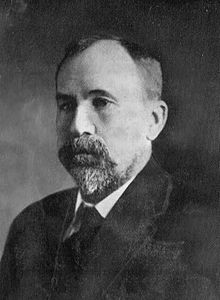James H. Hyslop
| James H. Hyslop | |
|---|---|
 |
|
| Born | James Hervey Hyslop August 18, 1854 Xenia, Ohio, US |
| Died | June 17, 1920 (aged 65) Upper Montclair, New Jersey, US |
| Occupation | Professor, philosopher, psychical researcher, parapsychologist, writer |
| Education |
Wooster College, Ohio (B.A., 1877) University of Leipzig (1882–84) Johns Hopkins University (Ph.D., 1877) |
| Subject | Ethics, logic, psychics, mediumship, afterlife |
| Spouse | Mary Hall Hyslop (née Fry) |
| Children |
George Hall Hyslop Mary Winifred Hyslop Beatrice Fry Hyslop |
James Hervey Hyslop, Ph.D, LL.D, (August 18, 1854 – June 17, 1920) was a professor of ethics and logic at Columbia University, a psychologist, and a psychical researcher. From 1906 until his death he was the secretary-treasurer of the American Society for Psychical Research. He was one of the first American psychologists to connect psychology with psychic phenomena.
Hyslop was educated at Wooster College, Ohio (B.A., 1877), the University of Leipzig (1882–84), and Johns Hopkins University (Ph.D., 1877).
He served as an instructor in Philosophy in Lake Forest University in Illinois during 1880–82 and 1884–85, as the head of Department of Philosophy in Smith College in Massachusetts during 1885–86, and as a faculty member in Bucknell University in Pennsylvania during 1888–89. From 1889–91 he worked as a tutor in philosophy, ethics and psychology. From 1891–95 he worked as an instructor in ethics and from 1895–1902 as the professor of logic and ethics in Columbia University.
During his years at Columbia University Hyslop wrote several textbooks, including The Elements of Logic (1892), Elements of Ethics (1895), and Problems of Philosophy (1905), and also became deeply involved with psychical research.
In 1902 he received an honorary degree (LL.D) from the University of Wooster.
Originally an agnostic and materialist, Hyslop's interest in psychic investigation increased after sessions with the Boston medium Leonora Piper, whom he first met as early as 1888. Hyslop’s first major experimental account of personal settings he had with Mrs. Piper was published in 1901 in the English proceedings. The issue as he saw it in this report was whether spiritism or telepathy exclusively from living people was the most rational explanation for the piper phenomenon, in particular, messages allegedly received from his deceased relatives. He concluded his lengthy account by saying that these messages forced him to ”give my adhesion to the theory that there is a future life and persistence of personal identity.... [and] to tolerate the spiritistic theory as rationally possible and respectable, as against stretching telepathy and its adjuncts into infinity and omniscience.” He believed that through her he had received messages from his father, his wife, and other members of his family, about which he reported in the Journal of the Society for Psychical Research (London, 1901). He became an active member of the Society for Psychical Research and of its American branch, working closely with the secretary of the American group, Richard Hodgson, and with William James.
...
Wikipedia
